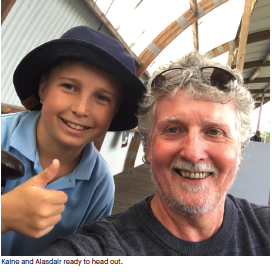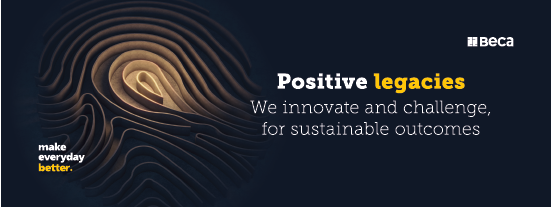As Hawke’s Bay’s new economic development agency begins to take shape, the organisations chair Alasdair McLeod, has a very clear view of where it will make its most impact.
The new regional development agency was announced in December 2021 with a $1.7 million annual funding commitment for three years, delivering on the existing Matariki Regional Economic Development Strategy (REDS).
Alasdair was named chair in late 2022 along with inaugural board members of Shayne Walker, Erin Simpson, Rawinia Kamau and Caren Rangi. One position remains open. As he looks to create a successful economic development agency, Alasdair is mindful that it remains clearly grounded to deliver on a strategy aimed at having a positive impact on as many people in the region as possible.
Alasdair has a long track record of involvement with economic development agencies, the first being over 20 years ago with the development of the Wellington ED agency, through to the creation of REDS in 2016-2017. Alasdair says the strategy isn’t about helping the fat cats getting fatter, but instead stays true to the vision of REDS that ‘every whānau and every household is actively engaged in and benefiting from growing a thriving Hawke’s Bay economy.’
It’s a tall ask, to deliver on a strategy that benefits over 180,000 residents from Central Hawke’s Bay to Wairoa but Alasdair only needs to point to feedback from Māori in the development of the initial strategy, which they said lacked meaningful engagement with Māori.
“We need to make sure that we have a strategy that facilitates and enables sustainable economic growth to the widest possible part of the community. It’s not about growth at all costs, it’s about protecting the household and whanau across our region.
Alasdair McLeod, Hawke’s Bay’s new economic development agency chairman. Alasdair recognises that Māori haven’t had the same opportunities as others and he is determined to ensure the likes of his young Big Brother, Big Sister mentee Kaine, are given every opportunity to succeed.
With each decision Alasdair only needs to fall back on some of conversations in 2016-2017 with the likes of Hamo McNeill, who was an adviser to Ngati Kahungunu, along with an unlikely encounter with mob leader Rex Timu as well as his Big Brother mentor role.
“If we are going to build a better Hawke’s Bay, it’s for everybody, not just a few at the top. “Kaine comes from a tough background and didn’t have the same opportunities as my own children. Yet he’s just as bright and for me, if I can change one life, like Kaine’s then I have done my job.
“He’s now in the workforce and can set his horizons higher.
“If we look at corporate opportunities through the lens of what does it mean for people that aren’t currently employed or are under-employed – how do we bridge the gaps because labour shortages come up time and time again – the issue isn’t labour shortages, the issue is we do a terrible job of encouraging, training, investing and promoting behaviours and skills that can change lives.
“I am absolutely determined the REDA will never lose sight of that lens, and we can’t have a booming economy that creates a wealth divide. That isn’t a win.”
The cyclone recovery offers a big opportunity for the region but decisions and investment need to happen quickly. The REDA will oversee the economic pou within the regional cyclone recovery framework and it will become one of the first tasks of an incoming chief executive.
“Cyclone Gabrielle has knocked us for six but we need to make sure that we have a strong progressive procurement strategy and any businesses that come into the region have to employ and train local people. “I am also looking at what steps we can take to protect local businesses and that they get recovery work.
My understanding is that didn’t happen after the Christchurch earthquakes and the local construction industry got completely swamped by the big conglomerates that came in and there was nothing to protect the little guys. Looking after our own capability is really important.
“We want to say Hawke’s Bay is open for business again – but we can’t do that until we have reliable infrastructure, particularly road, rail, sea and air networks.” A key step is working with Waka Kotahi and build some new decent infrastructure rather than fixing up what we have.
The primary sector has been the worst hit and Alasdair said it is important primary producers don’t fall back to traditional old-school ways but instead take the opportunity to challenge tradition and transform. He points to the challenges that the Merino wool sector has faced and how in 2010, The New Zealand Merino Company (NZM) and Government’s Primary Growth Partnership (PGP) undertook a $36 million, 5 year initiative designed to amplify the momentum and economic returns already evident in New Zealand’s fine wool sector, with substantial spillover for the benefit of the entire New Zealand sheep industry and the New Zealand economy.
“Primary Sector leaders went over to Stanford University and were exposed to the highest level of challenging thinking that just forced them to transform their models. It was a brilliant programme. We might not be able to get some of our leaders to Stanford but we might be able to bring Stanford to Hawke’s Bay or somewhere close to Hawke’s Bay … it is worth considering.”
The economic development agency is based at the new Business Hub in the former Post Office Building in Hastings, which also is the base for the Hawke’s Bay Chamber of Commerce, NZ Trade & Enterprise, Business Central and Export Hawke’s Bay.



